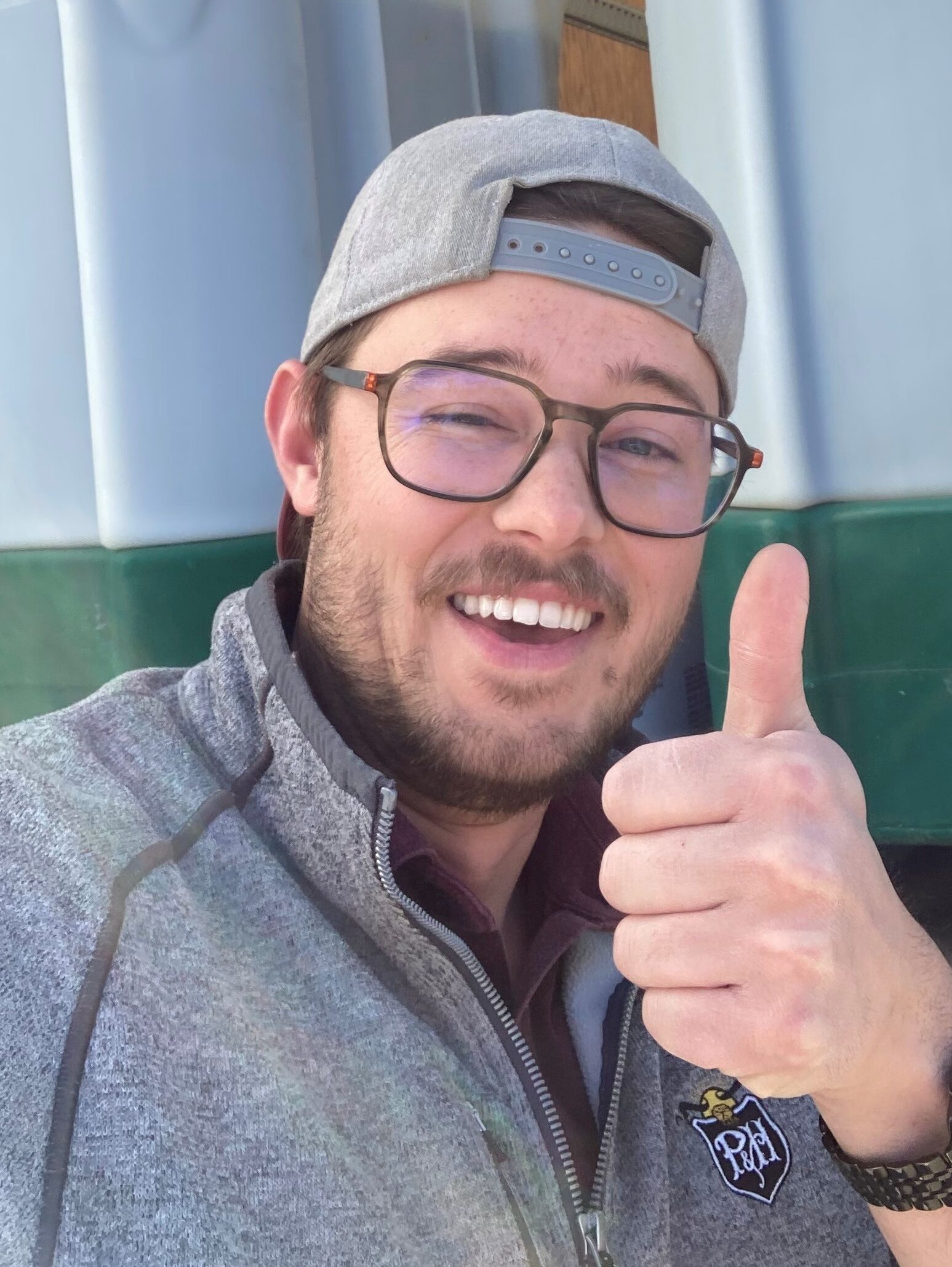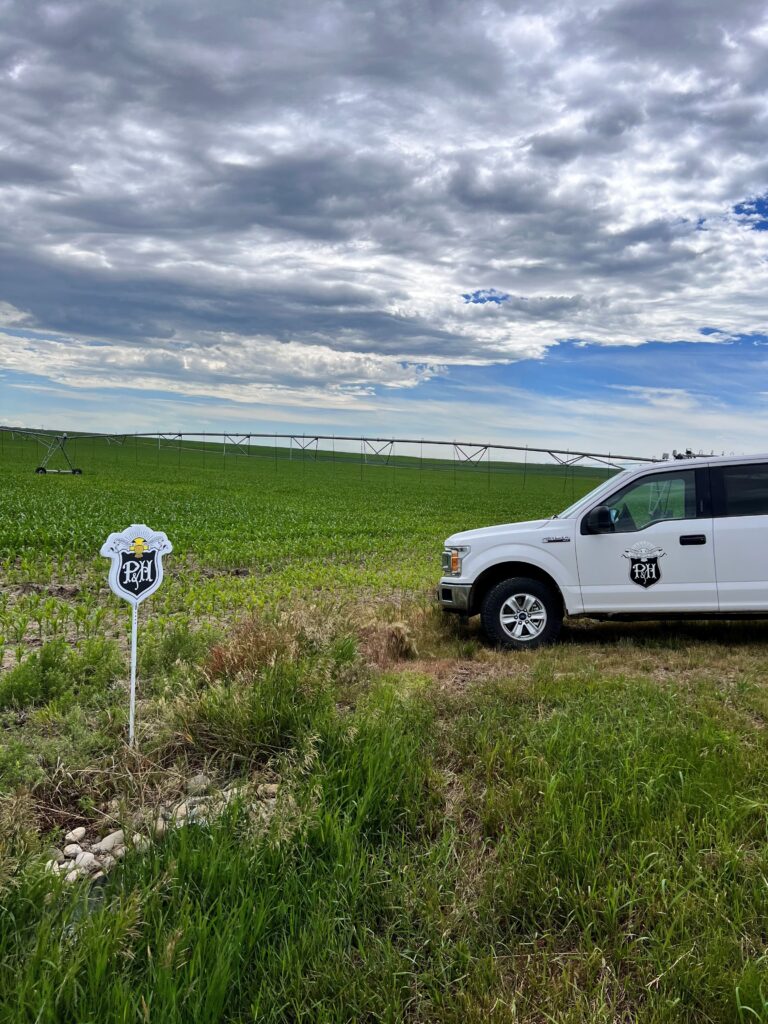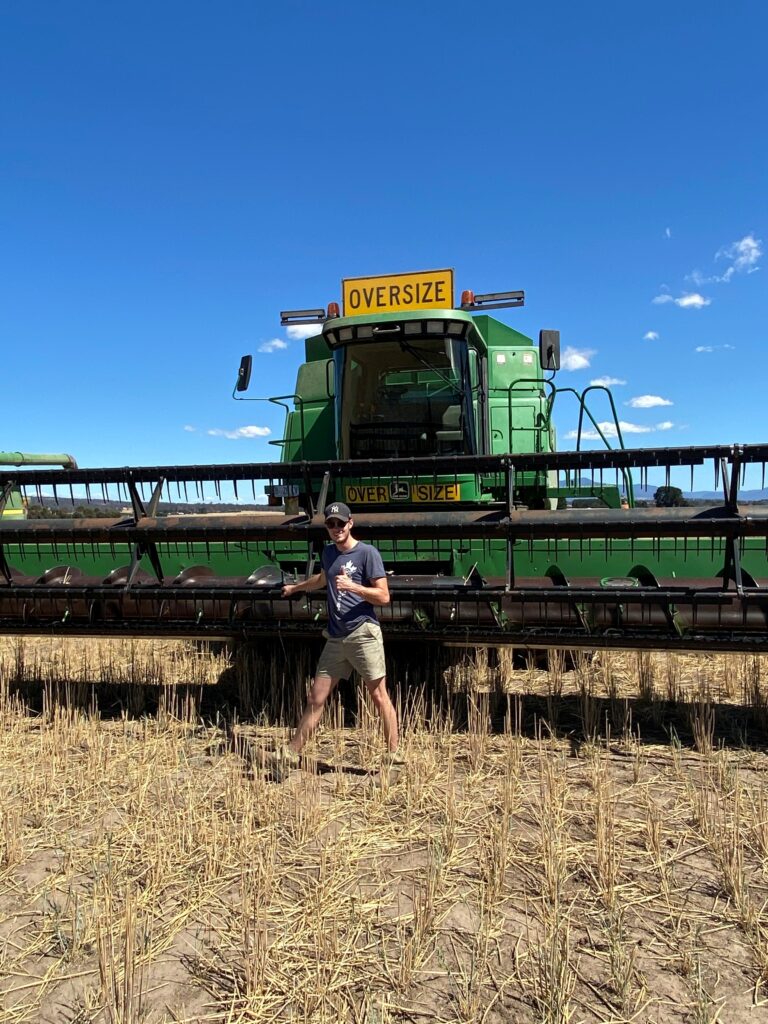Employee Spotlight: Brett Oosterbroek
May 2, 2025
Welcome to our new Employee Spotlight blog series, where we’re chatting with some of P&H’s knowledgeable staff from across our locations.
This month, get to know Brett Oosterbroek, Crop Inputs Manager at our Wilson Siding, AB (Lethbridge) location. Brett shed some light on what it takes to be an agrologist, the work he does, and even a bit about his time working on a farm in Australia.

Q: Can you tell us a bit about your background and education?
A: My family had a feed lot in Picture Butte (Alberta) until I was about 18, and then we sold it. Once I finished high school, I went to Lethbridge College for two years and got my Diploma in Agricultural Sciences (Plant and Soil Sciences). Then I did two more years at the University of Lethbridge and got my Bachelor of Science in the Agriculture department. After I graduated, I went to Tasmania and custom harvested in Australia for three months. Then COVID happened and I had to come home. I started as a summer student at P&H in April 2020 until that September, and now I’ve got a full time job here at P&H in Lethbridge. But my background has always been ag – started at the family feed lot and then just continued from there.
Q: What was your time in Tasmania/Australia like?
A: I was already planning a trip to Tasmania with a buddy from school and while we were out there, he gave me another guy’s contact info to do some farm work in Australia. So we called him and with three of my other buddies, we went out there and did farm work for three months. Combining, swathing, the whole works. We met a lot of cool people and farmers that way just sitting together and chatting while working. We also saw a lot of wallabies and kangaroos jumping around the fields while we worked, which was cool.
My buddies and I all stayed in a house together and whenever we had some time off or it was raining, we would just go travel and see more of Tasmania and Australia. Once we finished our three months of farm work, we traveled for two weeks on the mainland of Australia down the East coast – we made it from Melbourne to Brisbane before COVID hit and we had to come home.

Q: What does your day-to-day as an agrologist look like?
A: Agrology-wise, I do a bit more in the summer since that’s when seeding and just general crop maintenance happens. In the winter, I do more forecasting of chemicals or working through crop plans with farmers. A lot of crop planning in the winter. A big portion too is walking through fields with farmers, crop scouting, and crop staging. And now we have this TELUS Agronomy app that’s new this year, so I’ll probably start using that more.
I also help our summer students when we have them. So they’ll usually come with me, and I’ll show them how to crop stage, read identification, and things like that.
Q: What’s you’re favourite crop to work on/work with?
A: I kept going back and forth on this one. But it’s probably corn – corn is cool. It’s such a small see that grows super quickly into this huge crop that you get so many bushels out of. And it loves the heat, but then of course, always needs water. It seems like every day you go by a corn crop, it’s so different. I’ve got one farmer I work with where I’ll go to his corn one day and come back three days later, and it looks like a completely different field.
Q: What’s the most rewarding part of your job?
A: Definitely when things end up working out, like if you’ve got a farmer with weed problems for example, and we’re able to find a solution for them – maybe using a different chemical or identifying what their weed problems are. That of course makes the farmer happy, and making the farmer happy makes me happy. Being able to help the farmer is really, really important to me. That’s the most rewarding part.
Q: How does your work tie in to the agri-services that P&H offers?
A: Almost everything I do is agri-services, especially when I’m working with the farmers. So, whether it’s talking with farmers and figuring out crop plans, scouting, or even just generally helping them. And then there’s some older farmers whose kids are going to be or starting to take over the farm and helping them through that process, too. It really is a full-service role we provide at P&H.

Q: Can you take a bit more about your certifications and what the process was like to get them.
A: To become a PAg (Professional Agrologist), you need a combination of schooling, extra courses, and work in the field to be able to apply for your certification. Like I mentioned earlier, I did four years of schooling and got my Diploma for plant and soil sciences and then my Bachelor of Science in Agriculture. You also need a certain amount of completed work hours, and then of course I farmed in Australia for a little bit and then was a summer student at P&H. You also have to take and pass an ethics course to learn how to talk to farmers, solve problems ethically, things like that. You need to gain a certain number of credits every year and keep record of them. Once you have enough credits and hours worked, you can apply for your PAg.
I also got my 4R Designated Agrologist certification recently. You don’t need any formal schooling to get your 4R designation, but you do need to study the courses (Modules) and take a test to show that you understand proper usage guidelines for fertilizer.
Q: With all of the environmental changes happening in the world right now, do you anticipate your work changing in the next 5-10 years?
A: I think one of the big things that could change is fertilizer usage and how we work with it. You look at places like Europe who are strict on certain things, and they’re really drilling into their guys about not using too much fertilizer. But could there actually be a change here in 5-10 years? I don’t really know – it would have to come from the government. There would have to be a shift in the minds of farmers too, where they start asking themselves if they’re using too much fertilizer. But especially around here, that’s not really a thought because a lot of farms use manure rather than other fertilizers.
The other thing I could see changing is restrictions on chemicals. Looking back to Europe again, they’re strict on what you can and can’t use. Usually, a lot of things that Europe does, Canada tends to follow suit, in terms of usage and restrictions. There was one insecticide, for example, that ended up getting cancelled and then Canada had to get a whole new registration for it. But again, a shift like that would have to come from the government, so it’s hard to say whether it would actually happen.
Restrictions like this can impact access to markets – how you grow your crop could impact where it can be sold to. Working with a certified agrologist on crop plans can help alleviate some of these concerns. With the ongoing certification, we keep up to date with the latest registrations and regulations.
Q: Anything else you’d like to mention or talk about with your work that you’d want people to know?
A: I think sometimes people assume that if you’re an agrologist, you’re just trying to sell a product. Yes, we do sell products to farmers, but we’re not going to push a farmer to buy a product just to make money. If we recommend a product, it’s because we truly believe it’ll help the farmer to be successful. Not only that, but we also explore ways to use cheaper products, or even no product at all. I want farmers to know that if there’s a way to not sell them something and show them the value of our knowledge and expertise that way, then I think that’s even more impactful to the farmer. It’s all about doing what’s right for the farmer and what’s right for their individual operation.

To work with an agrologist like Brett, find your local P&H location and start the discussion today.